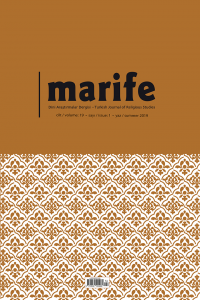
Marife Dini Araştırmalar Dergisi
Yazarlar: Abdurrahman BULUT
Konular:Din Bilimi
DOI:10.33420/marife.900571
Anahtar Kelimeler:Islamic Law,Usûl,Serahsî,Debûsî,Pezdevî
Özet: The first comprehensive work of Hanafi usûl (legal theory) literature is Cessâs’s al-Fusûl fi'l-usûl. This work contains important information about the tradition of the imâms of Hanafi madhab (school of law) up to the author’s time. Later, Debûsî conveyed the existing knowledge of Hanafi usûl thought, especially the work of Cessâs, in his work named “Taqwimul Adillah” and reshaped it with his own contributions in terms of subject classification and concepts. Although these two works are accepted as the founding texts of the Hanafi usûl literature, the two prominent works in terms of their impact on the later literature are Usûlü'l-Pezdevî and Usûlü’s-Serahsî. Serahsî, in his work named Usûl, which is considered as one of the two classical works of the Hanafi usûl literature, narrates the controversial issues within the sect and makes objections to some of the views and evaluations of the Hanafi scholars preceded him. Serahsî, who criticizes some of the views he conveyed as “erroneous”, also gives his personal opinion and preference on these issues by using phrases such as “According to me”, “Authentic opinion on this issue is” etc. Serahsî stated that he did not prefer the views of some Hanafi scholars such as Kerhî, Cessâs, and Halvânî in some of the controversial issues within the sect and expresses his personal opinion on the relevant issue. Moreover, on some issues, he objects to the mashayiqh of a region, by pointing to the region for example “Iraqi mashayiqh (jurist scholars)”. The two concepts that should be followed carefully regarding the controversial issues within the sect in Usûlü’s-Serahsî and the objections of Serahsî to the views of some Hanafi scholars are “ashâb (companions)” and “mashayiqh”. In many issues, Serahsî criticizes the view that he conveyed by referring to a Hanafi scholar without mentioning the name of the opinion holder with phrases such as “one (some) of our mashayiqh”, “one (some) of our late jurist scholars (mutaakhirun)” and sometimes “one of our ashâb” and expresses his own opinion on the issue. Although it is important what the personal opinion of Serahsî is in the related issues, it is also important in terms of the history of Hanafi usûl literature to determine to which Hanafi scholar the views he conveyed without specifying who the opinion holder is, belongs to. As a matter of fact, the determination of which Hanafi scholar's opinion are the objections mentioned in various issues and different contexts throughout this work can also offer possible answers to the question of what the main sources of Usûlü’s-Serahsî are. In some research studies in this area, it was determined that Serahsî benefited from the Taqwimul Adillah, but also revised this work in some ways. However, it can be stated that to what extent Serahsî benefited from Debûsî's work, and to have clearer information about his attitude towards this work, a comprehensive comparison is needed between these two works. The similarity between the usûl (legal theory) works of Pezdevî and Serahsî, who lived in the same period and the same region, has also been discussed in some studies in this field. Although some researchers have expressed important opinions on the question of what the relationship between these two works is, the evaluations on this issue have yet to be expressed at the level of estimation, and some studies on different aspects of this issue need to be made to make clearer determinations. In this article, we will try to show that the controversial issues within the sect in the usûl literature provide us with material on this subject. The names of Debûsî and Pezdevî are not mentioned at all in Usûlü’s-Serahsî. However, some of the views that Serahsî objected to without mentioning his name explicitly, belonged to Debûsî, who died fifty years before him, and to Pezdevî, who was raised in the same region with him and whose dates of death are very close to each other, are can be determined by comparing the opinions and explanations in their work. In this study, the objections of Serahsî to the views of Debusî and Pezdevî will be determined, and in the context of these objections, an evaluation will be made about the use of Debûsî and Pezdevî's works and their attitude towards these works. It is seen that the person whom he objected to his opinion without mentioning his name is Debûsî on some issues such as husun-qubuh, tahsisu’l-illah, the reason for the fasting, the meaning of the preposition (أو), the distinction between iktizâ and hazf, the effect of the opposition of ahl al-bid’ah on the ijma(consensus), the narration of a written text and the meaning of the conditional preposition. The person whom Serahsî objected to his opinion on some issues such as the judgment of analogy with istihsan, the vucub about child and the child's right to talaq, without mentioning his name is Pezdevî.